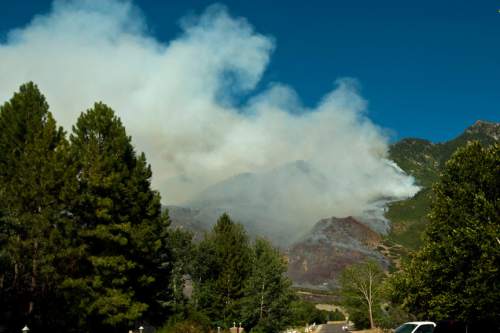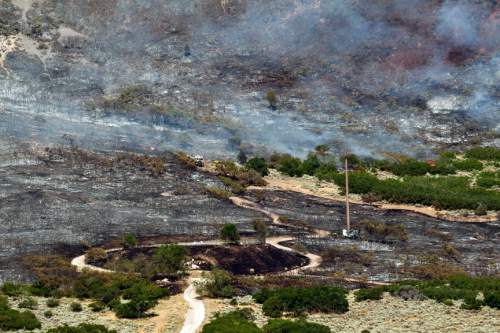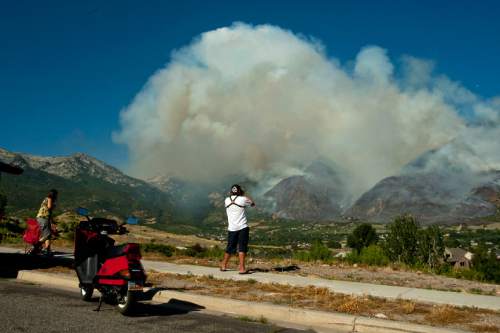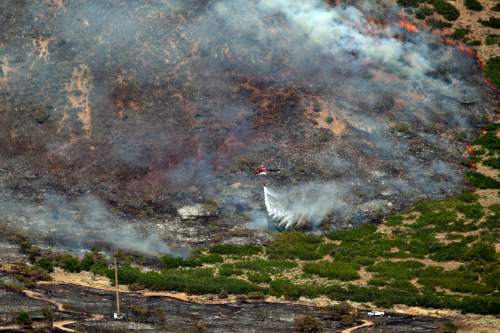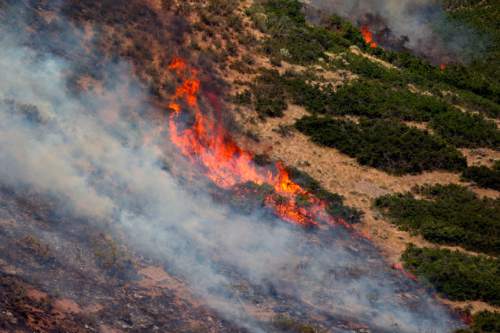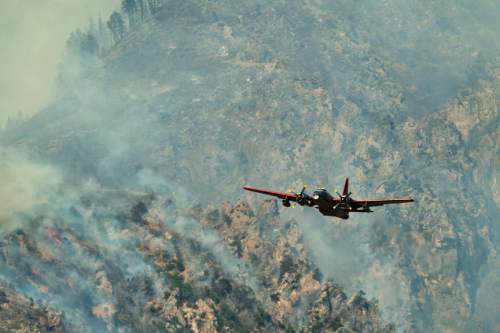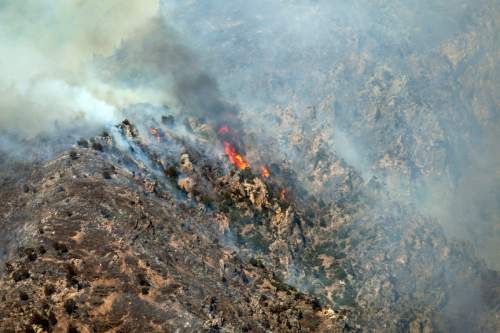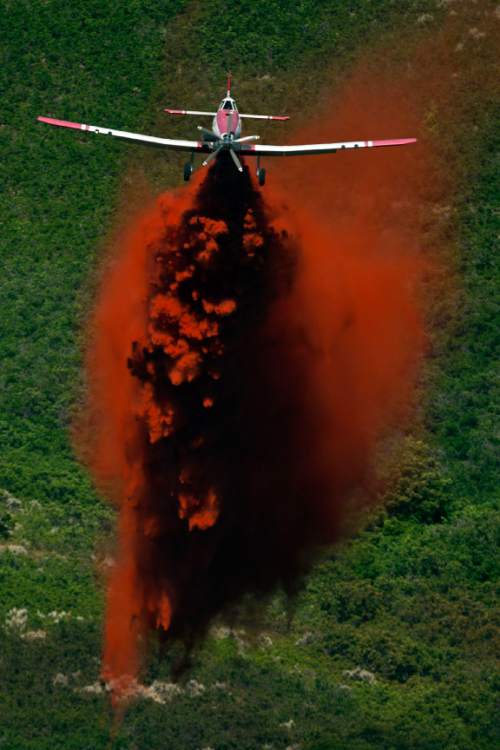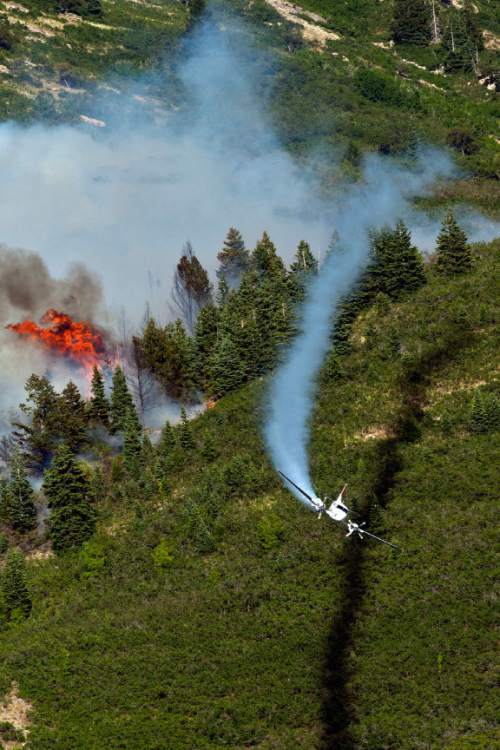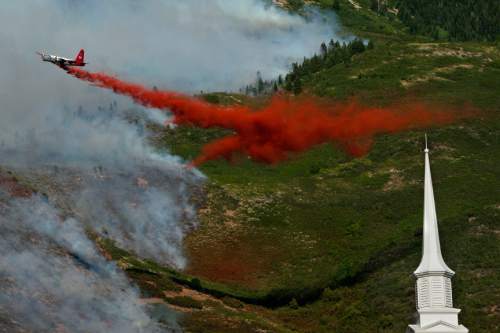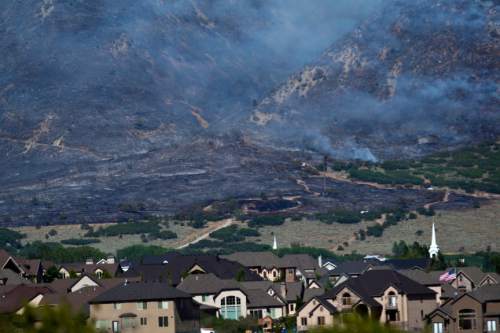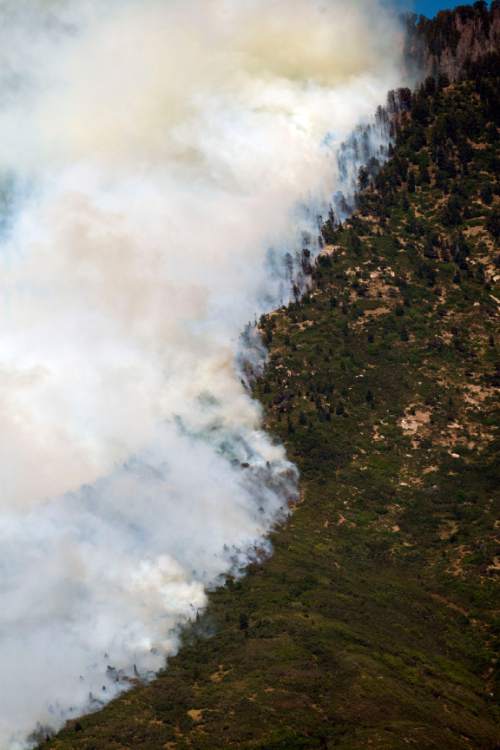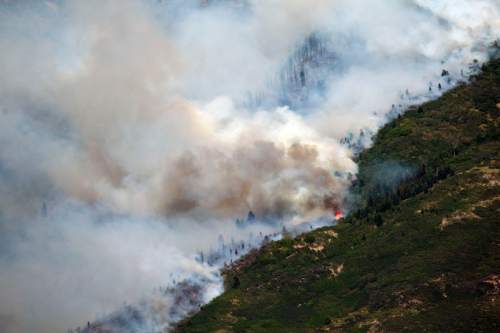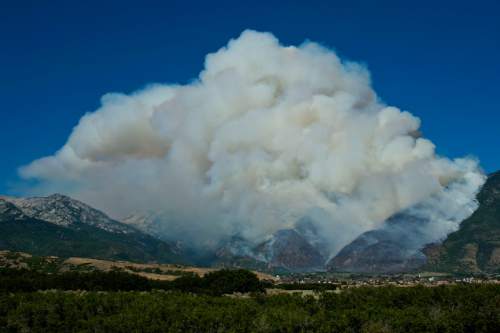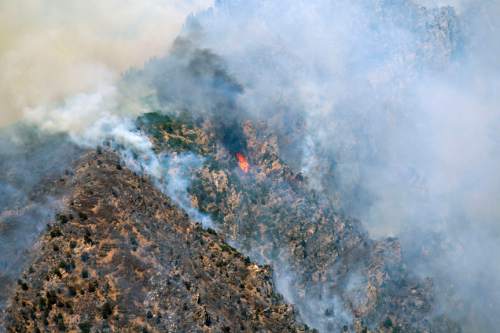Chris Detrick | The Salt Lake Tribune
The Quail fire burns above Alpine Tuesday July 3, 2012. A wildfire that started about 2 p
Chris Detrick | The Salt Lake Tribune
The Quail fire burns above Alpine Tuesday July 3, 2012. A wildfire that started about 2 p
Chris Detrick | The Salt Lake Tribune
Residents watch as the Quail fire burns above Alpine Tuesday July 3, 2012. A wildfire tha
Chris Detrick | The Salt Lake Tribune
The Quail fire burns above Alpine Tuesday July 3, 2012. A wildfire that started about 2 p
Chris Detrick | The Salt Lake Tribune
The Quail fire burns above Alpine Tuesday July 3, 2012. A wildfire that started about 2 p
Chris Detrick | The Salt Lake Tribune
Crews work to put out the Quail fire above Alpine Tuesday July 3, 2012. A wildfire that s
Chris Detrick | The Salt Lake Tribune
The Quail fire burns above Alpine Tuesday July 3, 2012. A wildfire that started about 2 p
Chris Detrick | The Salt Lake Tribune
Crews work to put out the Quail fire above Alpine Tuesday July 3, 2012. A wildfire that s
Chris Detrick | The Salt Lake Tribune
Crews work to put out the Quail fire above Alpine Tuesday July 3, 2012. A wildfire that s
Chris Detrick | The Salt Lake Tribune
Crews work to put out the Quail fire above Alpine Tuesday July 3, 2012. A wildfire that s
Chris Detrick | The Salt Lake Tribune
The Quail fire burns above Alpine Tuesday July 3, 2012. A wildfire that started about 2 p
Chris Detrick | The Salt Lake Tribune
The Quail fire burns above Alpine Tuesday July 3, 2012. A wildfire that started about 2 p
Chris Detrick | The Salt Lake Tribune
The Quail fire burns above Alpine Tuesday July 3, 2012. A wildfire that started about 2 p
Chris Detrick | The Salt Lake Tribune
The Quail fire burns above Alpine Tuesday July 3, 2012. A wildfire that started about 2 p
Chris Detrick | The Salt Lake Tribune
The Quail fire burns above Alpine Tuesday July 3, 2012. A wildfire that started about 2 p
Chris Detrick | The Salt Lake Tribune
The Quail fire burns above Alpine Tuesday July 3, 2012. A wildfire that started about 2 p.m. Tuesday in Lambert Park in Alpine has burned at least one structure -- a barn -- and 80 homes have been evacuated, according to the Lone Peak Police Department. Utah County Sheriff's Sgt. Spencer Cannon said the fire was human-caused -- somehow sparked by a man was working on a trackhoe near the Alpine rodeo grounds.
Chris Detrick | The Salt Lake Tribune
The Quail fire burns above Alpine Tuesday July 3, 2012. A wildfire that started about 2 p.m. Tuesday in Lambert Park in Alpine has burned at least one structure -- a barn -- and 80 homes have been evacuated, according to the Lone Peak Police Department. Utah County Sheriff's Sgt. Spencer Cannon said the fire was human-caused -- somehow sparked by a man was working on a trackhoe near the Alpine rodeo grounds.
Chris Detrick | The Salt Lake Tribune
Residents watch as the Quail fire burns above Alpine Tuesday July 3, 2012. A wildfire that started about 2 p.m. Tuesday in Lambert Park in Alpine has burned at least one structure -- a barn -- and 80 homes have been evacuated, according to the Lone Peak Police Department. Utah County Sheriff's Sgt. Spencer Cannon said the fire was human-caused -- somehow sparked by a man was working on a trackhoe near the Alpine rodeo grounds.
Chris Detrick | The Salt Lake Tribune
The Quail fire burns above Alpine Tuesday July 3, 2012. A wildfire that started about 2 p.m. Tuesday in Lambert Park in Alpine has burned at least one structure -- a barn -- and 80 homes have been evacuated, according to the Lone Peak Police Department. Utah County Sheriff's Sgt. Spencer Cannon said the fire was human-caused -- somehow sparked by a man was working on a trackhoe near the Alpine rodeo grounds.
Chris Detrick | The Salt Lake Tribune
The Quail fire burns above Alpine Tuesday July 3, 2012. A wildfire that started about 2 p.m. Tuesday in Lambert Park in Alpine has burned at least one structure -- a barn -- and 80 homes have been evacuated, according to the Lone Peak Police Department. Utah County Sheriff's Sgt. Spencer Cannon said the fire was human-caused -- somehow sparked by a man was working on a trackhoe near the Alpine rodeo grounds.
Chris Detrick | The Salt Lake Tribune
Crews work to put out the Quail fire above Alpine Tuesday July 3, 2012. A wildfire that started about 2 p.m. Tuesday in Lambert Park in Alpine has burned at least one structure -- a barn -- and 80 homes have been evacuated, according to the Lone Peak Police Department. Utah County Sheriff's Sgt. Spencer Cannon said the fire was human-caused -- somehow sparked by a man was working on a trackhoe near the Alpine rodeo grounds.
Chris Detrick | The Salt Lake Tribune
The Quail fire burns above Alpine Tuesday July 3, 2012. A wildfire that started about 2 p.m. Tuesday in Lambert Park in Alpine has burned at least one structure -- a barn -- and 80 homes have been evacuated, according to the Lone Peak Police Department. Utah County Sheriff's Sgt. Spencer Cannon said the fire was human-caused -- somehow sparked by a man was working on a trackhoe near the Alpine rodeo grounds.
Chris Detrick | The Salt Lake Tribune
Crews work to put out the Quail fire above Alpine Tuesday July 3, 2012. A wildfire that started about 2 p.m. Tuesday in Lambert Park in Alpine has burned at least one structure -- a barn -- and 80 homes have been evacuated, according to the Lone Peak Police Department. Utah County Sheriff's Sgt. Spencer Cannon said the fire was human-caused -- somehow sparked by a man was working on a trackhoe near the Alpine rodeo grounds.
Chris Detrick | The Salt Lake Tribune
Crews work to put out the Quail fire above Alpine Tuesday July 3, 2012. A wildfire that started about 2 p.m. Tuesday in Lambert Park in Alpine has burned at least one structure -- a barn -- and 80 homes have been evacuated, according to the Lone Peak Police Department. Utah County Sheriff's Sgt. Spencer Cannon said the fire was human-caused -- somehow sparked by a man was working on a trackhoe near the Alpine rodeo grounds.
Chris Detrick | The Salt Lake Tribune
Crews work to put out the Quail fire above Alpine Tuesday July 3, 2012. A wildfire that started about 2 p.m. Tuesday in Lambert Park in Alpine has burned at least one structure -- a barn -- and 80 homes have been evacuated, according to the Lone Peak Police Department. Utah County Sheriff's Sgt. Spencer Cannon said the fire was human-caused -- somehow sparked by a man was working on a trackhoe near the Alpine rodeo grounds.
Chris Detrick | The Salt Lake Tribune
The Quail fire burns above Alpine Tuesday July 3, 2012. A wildfire that started about 2 p.m. Tuesday in Lambert Park in Alpine has burned at least one structure -- a barn -- and 80 homes have been evacuated, according to the Lone Peak Police Department. Utah County Sheriff's Sgt. Spencer Cannon said the fire was human-caused -- somehow sparked by a man was working on a trackhoe near the Alpine rodeo grounds.
Chris Detrick | The Salt Lake Tribune
The Quail fire burns above Alpine Tuesday July 3, 2012. A wildfire that started about 2 p.m. Tuesday in Lambert Park in Alpine has burned at least one structure -- a barn -- and 80 homes have been evacuated, according to the Lone Peak Police Department. Utah County Sheriff's Sgt. Spencer Cannon said the fire was human-caused -- somehow sparked by a man was working on a trackhoe near the Alpine rodeo grounds.
Chris Detrick | The Salt Lake Tribune
The Quail fire burns above Alpine Tuesday July 3, 2012. A wildfire that started about 2 p.m. Tuesday in Lambert Park in Alpine has burned at least one structure -- a barn -- and 80 homes have been evacuated, according to the Lone Peak Police Department. Utah County Sheriff's Sgt. Spencer Cannon said the fire was human-caused -- somehow sparked by a man was working on a trackhoe near the Alpine rodeo grounds.
Chris Detrick | The Salt Lake Tribune
The Quail fire burns above Alpine Tuesday July 3, 2012. A wildfire that started about 2 p.m. Tuesday in Lambert Park in Alpine has burned at least one structure -- a barn -- and 80 homes have been evacuated, according to the Lone Peak Police Department. Utah County Sheriff's Sgt. Spencer Cannon said the fire was human-caused -- somehow sparked by a man was working on a trackhoe near the Alpine rodeo grounds.
Chris Detrick | The Salt Lake Tribune
The Quail fire burns above Alpine Tuesday July 3, 2012. A wildfire that started about 2 p.m. Tuesday in Lambert Park in Alpine has burned at least one structure -- a barn -- and 80 homes have been evacuated, according to the Lone Peak Police Department. Utah County Sheriff's Sgt. Spencer Cannon said the fire was human-caused -- somehow sparked by a man was working on a trackhoe near the Alpine rodeo grounds.


